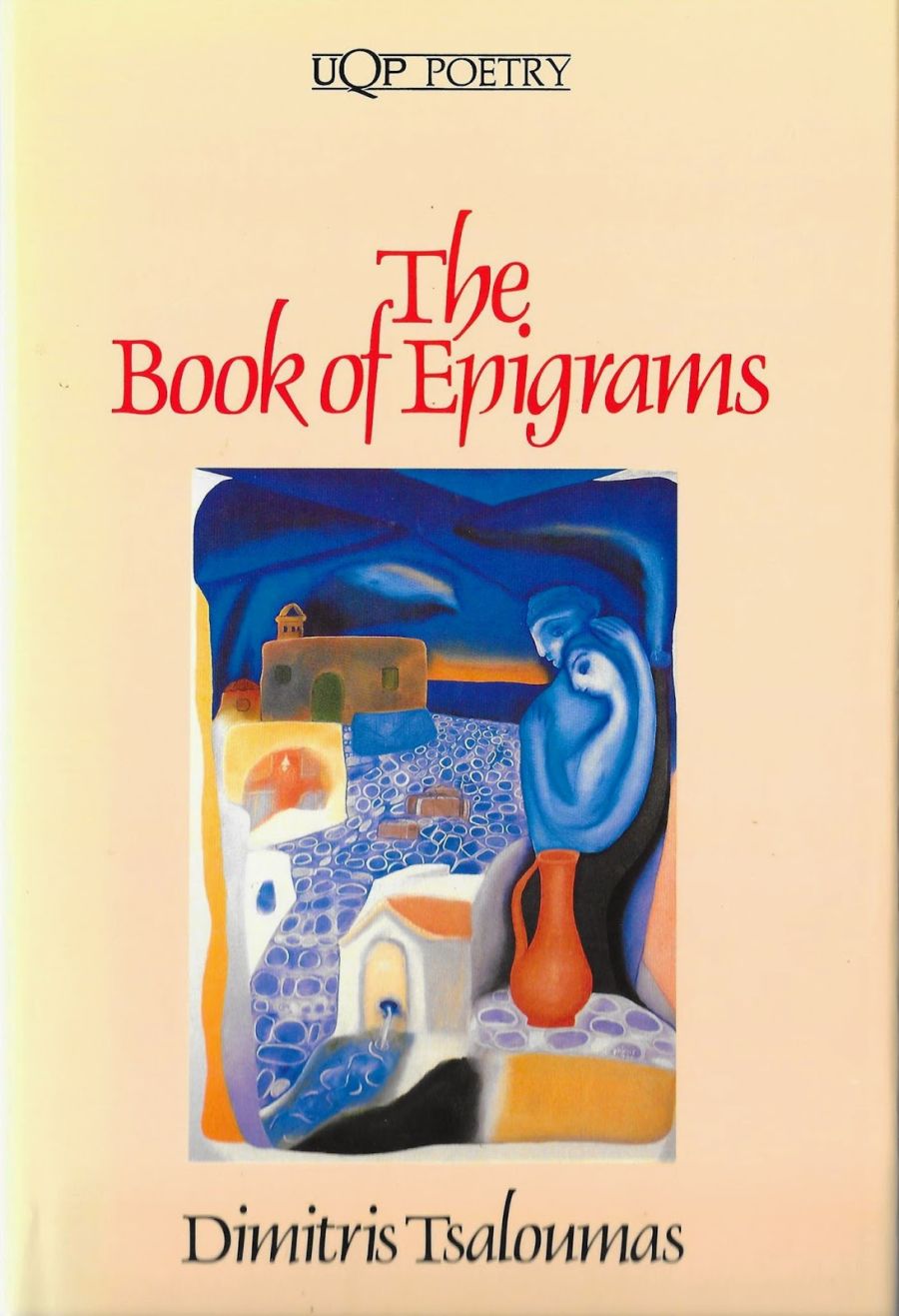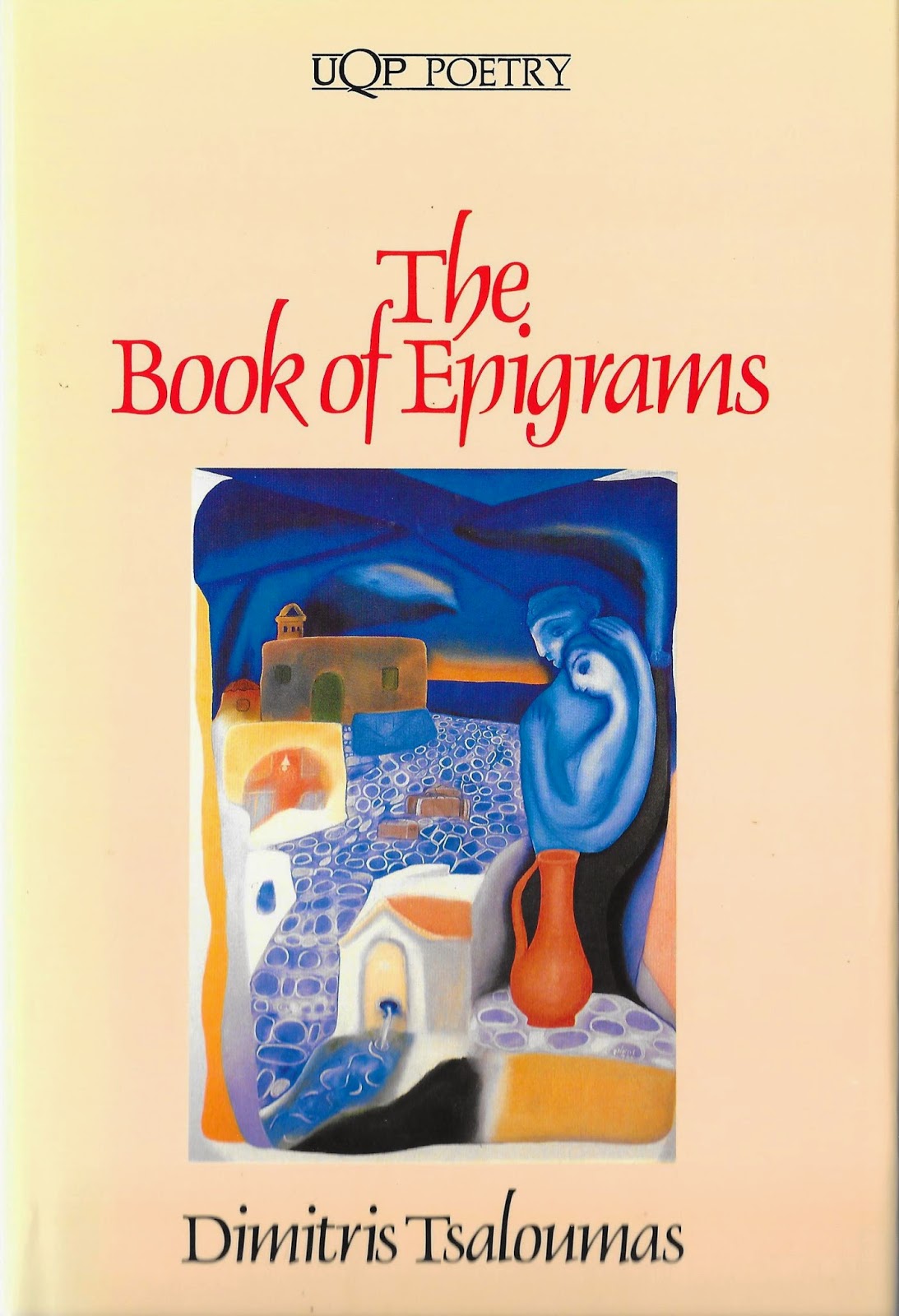
- Free Article: No
- Contents Category: Poetry
- Review Article: Yes
- Article Title: Refugee from nightmare
- Online Only: No
- Custom Highlight Text:
Tsaloumas is not a poet of the migrant experience. He does not evoke nostalgia for a homeland out of some experience of anguish as a stranger in a foreign culture. He defies such narrow limits. If some of his poetry refers to his homeland it is within the broader framework of nostalgia, of a feeling of loss or rejection, of Mneme.
His poetry in this collection encompasses a multiplicity of subject matter and style. He looks at the past through what remains of it in time present, yet time present in its own right cannot retrieve the past (‘Morning Start’). He avoids prophesying about the future, which he says is the domain of the representatives of the people with their brassy voices – politicians. He precludes the possibility of a vision of the future being created conclusively by looking through the “lookouts” of today or the past. He might well say, leave that to the enigmatic oracles and the exhortations of the politicians – to Messianism.
- Book 1 Title: The Book of Epigrams
- Book 1 Biblio: UQP, 207pp., $14.95
- Book 1 Cover Small (400 x 600):

- Book 1 Cover (800 x 1200):

The poems in the collection can be grouped as narrations of events retrieved from the past; simple recollections; reveries full of nostalgia; creations of a mood; references to the process of poetic creation; political or social criticism, usually with a bitter touch of irony or sarcasm; summations of whole ideological systems of ethical positions and their relation to present reality. (In the last type extensive use of mythology is made.)
The collection starts with an address to the reader. From the outset, the poet makes the reader aware of the mediation he offers; a mediation which can only rob the reader of the immediacy of his own semantic (meaning) creation. The poet appears as a person who has mitigated the harsh elements of human experience, has managed to save the echoes of Nature, and has studied the remnants of dreams to reveal to the reader the nightmare. A nightmare expressed in verse, for “there is no bitterness like the music of verse”. The art of poetic creation is seen as an art of creating words; as a process of involving their defilement and setting aright (‘Gypsy Blues’); of awakening the reader to the injustices of the world (‘To the Reader B’); of writing no longer about “idols of loves and heroes” (‘Worship’), but about the Hubris committed by man against man (‘Rebellion’) against God (‘God’) against Nature (‘Puzzlement’, ‘Smog’, ‘Hubris’) and against Poesis (‘Advice’).
Tsaloumas uses both Greek and Christian mythology. In ‘Antigone’ the tragedy of Antigone, the symbol of disobedience to man-made law which runs contrary to natural ethical law, becomes something that can no longer be recognised. Although he suggests that Antigone’s tragedy is enacted in our everyday life, it goes unrecognised until the mediation of writing brings the dirge of her sacrifice to our consciousness. Only reading about it spurs us into action, to the rescue of Antigone. However, the mediation of the book cannot capture the essence of the tragedy of Antigone and, hence, the attempted rescue must fail.
Our capacity to experience with immediacy has become blunted; and no art of reading can compensate us for our loss. When the tragedy of Antigone has become a mere scholarly affair, an archaeology of unjust human suffering, we are left with delusion, with nothing.
In ‘Feast of Minos’s Palace’ Tsaloumas again makes use of mythology. The private grief of the king cannot disturb for long the gaiety of the courtiers nor can elemental nature disturb the superficiality of court culture – a culture which attempts to deny what wishes not tocomprehend and which even aesthetisizes the suffering and shame that it chooses not to feel. The king is left alone with his grief. The sighs of the courtiers only momentarily break their gaiety and, indeed, the sighs become caught up in the gaiety itself:
but instantly the music returns
and flutes embroidering the sigh
The essentially private nature of grief is reconfirmed in his poem ‘Lazarus’, where the poet begs to be let in “before the visitors arrive”. The futile gathering of the faithful, of witnesses, will not avert the “currents from the abyss” – the finality of death, even if the name of the deceased is Lazarus.
In ‘Judas’, Judas the symbol of betrayal, and expiation in remorse and suicide, has no place in a society of pragmatists. Judas, the bearer of the thirty pieces of silver, fruit of his betrayal, now lives among us without any remorse, buying and selling, not squandering in debauchery his rewards from these transactions to quell an uneasy conscience.
The poetic ‘I’ here affirms its identity with the symbolic presence and invites a purely pragmatic Judas to share “the bread and wine” of his own communion; thus ironically inverting the meaning of Christ’s sacrifice.
In ‘Gods’ the pagan gods with their anthropomorphic characteristics and the spiritual, obscure god of Christianity with its emphasis on individual consciousness have died. The prosaic, demystified god of monetary exchange remains. He dies unceremoniously in his bed, but he is recognized as the Saviour. The Sacred, the transcendental, has been eliminated as non-saleable, as non-quantifiable. In the world where the god of exchange rules there is no conflict between the gods themselves to gain supremacy over the world, no conflict between god and the world. The myth of Prometheus is reversed. Man brings wisdom to the Gods.
Tsaloumas’ characteristic use of mythology naturally leads to political and social critique. It is generals, political leaders, spies and above all traitors who “lift the nightmare’s lid and screaming mad the obscene creatures of the dark pour out to foul my blood and make it poison-bitter”. In CHOGM – Melbourne 1981 – he presents the gathering of the Commonwealth heads of government with caustic sarcasm. We have the hyperbolic description of an event pretending to world significance only to end with an earthly baseness, which signifies that this event is one without possibilities, without hope for humanity and, indeed, may be the source of new problems:
where politicians fart
is where the troubles of angels start.
In ‘Elections’ the stern political leaders after winning office withdraw to their country estates to “portion out the future”. In the uneasy quietness that follows there is a new upsurge of hope, “the people are waiting for changes” which will never eventuate. When people are led to rebel against oppression of the king, the reaction of power (king) is force; of Christ (Religion), more saints and sufferings:
It’s fire they’ll send,
the king armed men, and our Christ
tribulations and saints. For like
millstones be the great
my son, like an olive-press the risen. (‘Rebellion’)
It seems there is no escape but also no need for submission. In the poem ‘Instead of Prayer’ a suppliant is not the man who will bear the sorrow, for the present commands for a new answer not the servile humility of the beggar.
Although Tsaloumas deals with the ‘nightmare’ his poetry is not entirely pessimistic.
The poems ‘Entreaty’ and ‘Full Moon’ are celebrations of Nature and its creative force. The imagery is sensual, emphasising nature’s fecundity, and an almost frenetic mood of creation prevails, akin to that of surrealistic poetry. It appears from the collection that Tsaloumas is a poet who is refusing to give in, to the unconditional optimism in the future, to the glorification of the work ethic which has no humanistic goals, to the extermination of God and the transcendental, to the ignoring of human suffering and deception.
His use of mythology and sociopolitical criticism does not lead to a recuperation of some lost religion or some lost spiritual quality or lost political platform. He criticizes any attempts towards pseudo-spiritualization or mythologization of present reality. He uses mythology to criticize through contrast a prosaic world with a world wherein the creation and maintenance of transcendental human values were still possible. Unfortunately, even in this excellent translation, Tsaloumas’ stylistic innovations and richness of language, which are an important element in his poetry, cannot be transmitted into English. The ambiguity of words and use of folk-song motifs is lost in the translation as is the sound texture of his poems.
The collection overall shows that Tsaloumas is an individual poet. His is a profound spiritual (in its Greek form – pneuma) and social vision embodied in a form which is innovative and a poetic force which is striking.


Comments powered by CComment